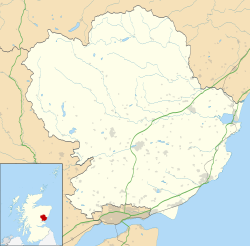| Monikie | |
|---|---|
Location within Angus | |
| Population | est. 479. [1] (1991) |
| OS grid reference | NO499387 |
| Council area | |
| Lieutenancy area | |
| Country | Scotland |
| Sovereign state | United Kingdom |
| Post town | DUNDEE |
| Postcode district | DD5 |
| Dialling code | 01382 |
| Police | Scotland |
| Fire | Scottish |
| Ambulance | Scottish |
| UK Parliament | |
| Scottish Parliament | |
| Website | https://www.monikie.co.uk |
Monikie is a village and civil parish in Angus, Scotland, north-east of Dundee. [2]



